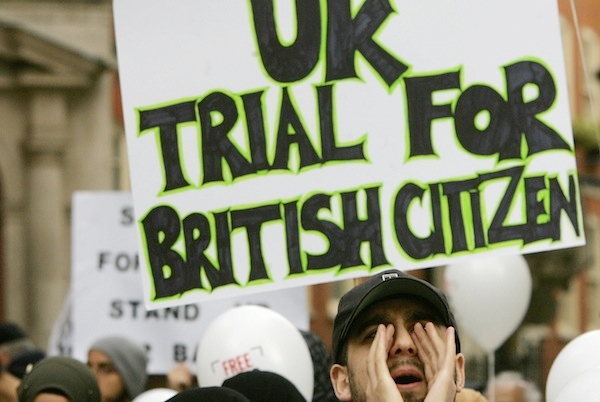Just when it seemed like Babar Ahmad had exhausted all his options to avoid extradition to the United States on terrorism charges, a new twist has emerged. Yesterday, a wealthy tycoon from Newcastle, Karl Watkin, said he would bring a private prosecution against Ahmad.
In theory, anyone can bring a private prosecution if they can demonstrate it is in public interest to do so. Individuals bringing such actions act in cases where they believe the Crown Prosecution Service has failed in its duty to initiate criminal proceedings.
Ahmad has been held in custody since August 2004 after the United States requested his extradition on terrorism charges relating to a website he operated called Azzam.com. Although the site was run from London, it was hosted in Texas which prompted the Americans to initiate criminal proceedings against him.
Watkin has said he is bringing the prosecution to protest Britain’s extradition treaty with the United States which many campaigners believe is lopsided and weighted against British citizens. They argue it streamlines the extradition of British offenders while offering them few safeguards.
‘This controversy is unwarranted, and the critics’ claims are incorrect,’ argue Theodore Bromund and Andrew Southam in a report published by the Heritage Foundation yesterday.
One of Ahmad’s central claims against extradition is that, if convicted, he would face life imprisonment in a federal ‘supermax’ facility. Yet, as Bromund and Southam point out:
…in an April 2012 decision allowing the extradition of five terrorist suspects from Britain to the U.S., the ECHR found that inmates in U.S. supermax prisons, ‘although confined to their cells for the vast majority of the time,’ were ‘provided with services and activities (television, radio, newspapers, books, hobby and craft items, telephone calls, social visits, correspondence with families, group prayer) which went beyond what was provided in most prisons in Europe.’
This is a severe blow to those who argue that the supermax regime constitutes inhumane treatment which outlawed by the ECHR. ‘If you follow the ECHR’s line of thought, you could well argue that it is imprisonment in Europe, not a US supermax, that is inhumane’ Bromund tells me. ‘One need not be an apologist for the US system to recognise that European systems, and the British one, are nothing to write home about.’
Watkin has no view on Ahmad. ‘I don’t know whether these men are totally innocent or as guilty as hell – that’s for a court to determine with the benefit of all the evidence,’ he told the BBC.
His view is that, as British citizens who potentially committed crimes while living here they should face British justice. It appears, however, his initiative is unlikely to succeed.
‘The CPS has clear guidance that they should exercise their power to step in and stop a private prosecution where it’s in the public interest to do so,’ Thom Dyke, a barrister specialising in public law, tells me. ‘Where a private prosecution has been brought with the intention of frustrating or interfering with other criminal proceedings, the CPS would be almost duty-bound to take over in order to stop the case.’
With all his avenues of appeal through the European courts proving unsuccessful, Ahmad is unlikely to find any respite in Watkin’s plan to initiate private proceedings here. He was probably advised of this from the outset but has achieved one of his goals at least; renewing the debate about our extradition treaty with the United States.






Comments